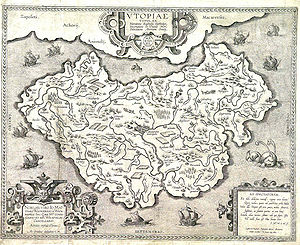In etymology, the word Utopia comes from the Greek ou (not) and topos (a place). Definition of "Utopia" Coined by Sir Thomas More in 1516, this word described the perfect society on a small, remote island in his socio-political frame-narrative Utopia. In one word, Lansing effectively described the crew's feeling towards South Georgia while being consistent with the initial use of the word in depicting a small island. Lansing uses precise diction in this case in making South Georgia symbolic to the Utopia's impossibility of existence. This also foreshadows that South Georgia is not a utopia, meaning there are still difficulties ahead, such as the mountainous terrain faced in the next chapter. Although indirect, the use of Utopia shows that the crew longed to be there, but felt that they would not arrive there; hence, the etymology of Utopia, "not a place," is used correctly in both the denotative and connotative sense of the word.
 |
| A map of More's Utopia. |
No comments:
Post a Comment